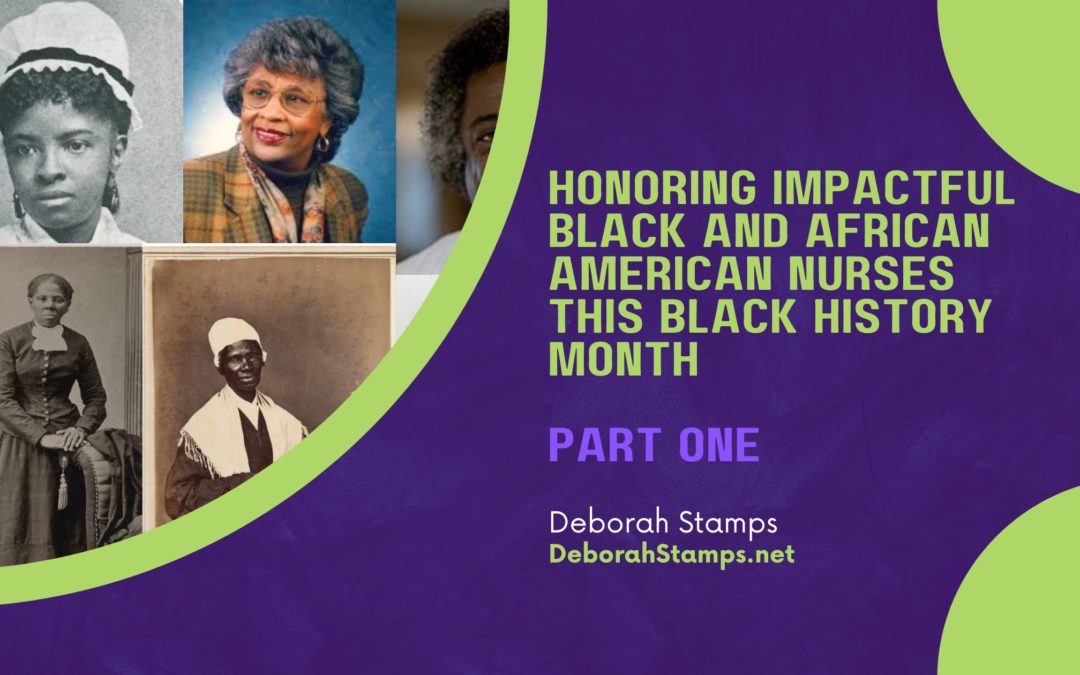As we celebrate Black History Month, it is time to honor the achievements of African-Americans and these individuals’ contributions to our country’s history.
During Black History Month, we also must honor the achievements of individuals who have made notable contributions to nursing and healthcare. Today, around 10% of nurses are African-American or Black. These individuals have broken down barriers and paved the way for others.
African American or Black nurses have shown grit, integrity, and perseverance to earn the same qualifications and positions as their non-black colleagues. Institutions such as Chi Eta Phi Sorority, Inc, founded October 16, 1932 at Freedman’s Hospital noe HOward Univerity Hspital in Washington DC, ( Home – Chi Eta Phi Sorority, Inc Chi Eta Phi Sorority, Inc), focusing on health promotion/disease prevention, leadership development, mentoring, recruitment, retention and scholarship. The National Black Nurses Association (NBNA), founded in 1971 in Celveland Ohio strives to improve the health of African American people and to improve access of nursing education and leadership positions for African Americans.
While there are still work to be done to eliminate rascism, the resilience and perseverance by so many incredible African-American nurses. The profession of nursing is stronger, wiser, and more powerful because of our African American heritage.
The history of African-American nurses in the US has been marked by their struggle for freedom, education, job opportunities, and equitable healthcare. Even when they couldn’t receive a formal education, they still played a vital role in their communities.
We honor the achievements of notable African-American nurses during Black History Month. They have made a significant impact on the nursing profession and the world. From Harriet Tubmann to modern-day leaders, these individuals have left a lasting impression on our history.
Sojourner Truth
Most people associate nursing history with the achievements of prominent individuals such as Dorothea Dix, Clara Barton, Florence Nightingale, and more. While we must remember these individuals, we must also pay tribute to the African-American mothers who influenced the profession.
It is widely known that abolitionist and formerly enslaved person Sojourner Truth escaped her life of slavery. However, many need to learn that she also worked as a nurse. When freed, she became a staff member of the National Federation of African-American Relief Associations in Washington, DC. As a part of this organization, she advocated for establishing nursing education programs and training grants.
Harriet Tubman
Harriet Tubman, who is historically known for her role as a conductor and abolitionist on the Underground Railroad, also made a significant contribution to nursing. While working for the Union Army, she tended to the wounded and sick African-American soldiers in South Carolina.
She treated the sick and injured Union troops as a matron at Fort Monroe in Virginia. Tubman provided various types of therapies to Union soldiers who were suffering from smallpox and dysentery.
Following the war, Tubman continued working as a nurse. In 1908, she established a nursing home for the elderly and informants known as the Harriet Tubman Home for Aged & Indigent Negroes.
Mary Eliza Mahoney
Although many African-American nurses before her were already serving the profession, Mary Ezra Mahoney is considered the first African-American nurse in the United States because she was the first to graduate from nursing school and become a licensed professional. She worked at a hospital for over 15 years. According to the National Women’s History Museum, she was a nurse’s aide, janitor, cook, and washerwoman during her time with the New England Hospital for Women and Children.
When she was 33, she enrolled in the hospital’s nursing program. Sixteen months later, she officially graduated and became the first African-American nurse in history. Mahoney fought against discrimination and advocated for establishing the National Association of Colored Graduate Nurses (NACGN) in 1908.
Estelle Massey Osbourne
In the U.S., Estelle Massey Osbourne was the first African-American woman to receive a master’s degree in nursing. She also served as the first Black faculty member at New York University’s College of Nursing.
She paved the way for African-American nurses to take on leadership roles and educational opportunities in nursing. Through her work, Osborne broke down various barriers that prevented women and women of color from entering the nursing profession. Her impact is significant and changed the trajectory of nursing.
Bernardine Lacey
A distinguished nursing professional, the American Academy of Nursing has named Bernardine Lacey a “Living Legend.” She is regarded as a political advocate, a researcher, a clinician, and a leader.
When Bernardine Lacey decided to study at a nursing school, it was the only one that would admit African-American students. During her time in nursing school, she and the other African-American students were forced to sit in the back row. A white professor once told her, “you don’t have any business being this good,” when she received high marks.
In 2014, Bernardine Lacey received the American Academy of Nursing’s highest honor and was inducted as a “Living Legend.”
Ernest J. Grant
Ernest J Grant made history as the first American Nurses Association male president. As an internationally-known burn expert, Grant was named Nurse of the Year for his exceptional work treating burn patients after the attacks of 9/11.
As the president of the ANA, Grant is responsible for representing the interests of the organization’s four million registered nurses. He has also worked to promote diversity within the nursing profession. In 2002, President George W. Bush presented him with the Nurse of the Year award for his work treating the World Trade Center burn victims.
In 2020, Grant spoke out following the murder of George Floyd and urged nurses to speak out and advocate for change. Ernest J Grant said, “The Code of Ethics obligates nurses to be allies and to advocate and speak up against racism, discrimination, and injustice. This is non-negotiable. Racism is a longstanding public health crisis impacting mental and physical health.”

